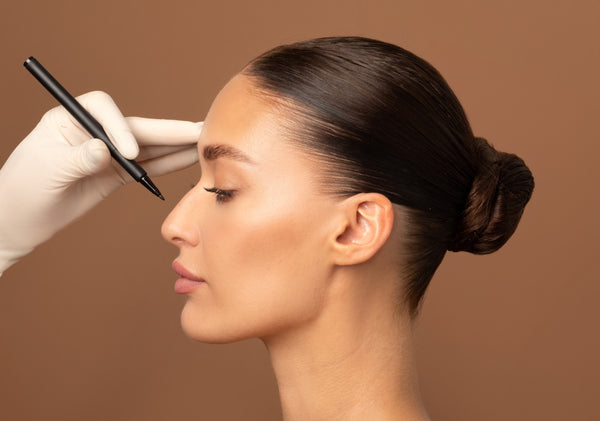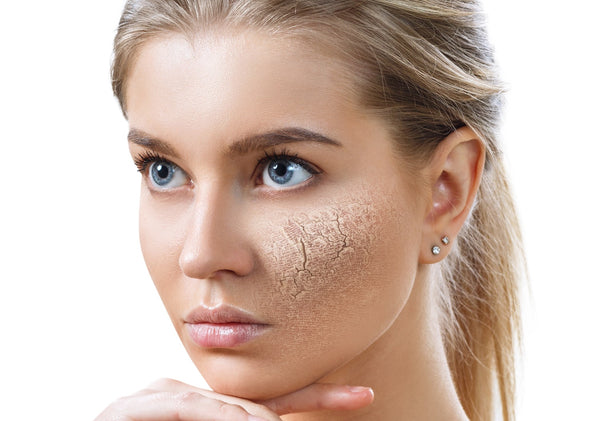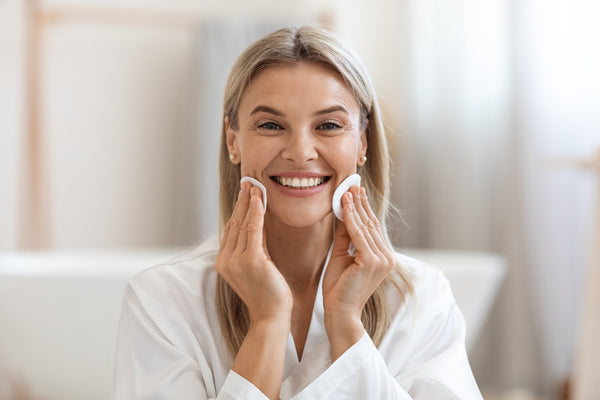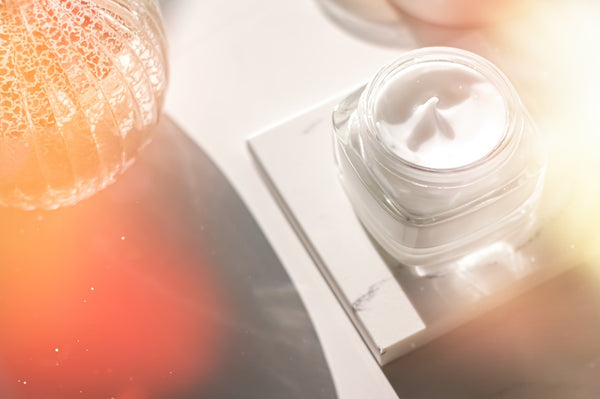Is Fragrance in Skincare Bad?

Does fragrance in skincare offer aromatic bliss or is it risky business? This question has rippled through the beauty community, igniting debate for years. As consumers get increasingly savvy about what goes into their skincare, fragrance additives are at the center of the discussion.
At MD GLAM, we love to see our audience becoming more knowledgeable about ingredients and demanding product transparency. As advocates for clarity and skincare safety, we're happy to offer a balanced perspective on this hot-button issue.
So, is fragrance a harmless addition that elevates our skincare rituals, or is it a stealthy instigator of allergies and skin sensitivity? Read on to find out.
Why is Fragrance Added to Skincare Products?
Fragrance in skincare is nothing new. Aromatic oils have been used for cosmetic and medicinal purposes since ancient Egypt. Today, they remain a staple in beauty and skincare formulations.
When it comes to modern-day skincare, fragrances serve multiple purposes. For starters, they mask the natural odors of other ingredients (like sulfur or hydrolyzed collagen), which may not be so pleasing to the nose.
…which brings us to the next reason.
A nice scent can transform your everyday skincare routine into something that feels more like pampering. You know that beautifully scented moisturizer that feels like a mini escape after a long day? That experience is all thanks to the aromatic touch.
But not all fragrance is created equal.
Types of Fragrances Used
Fragrance in skincare isn’t a one-size-fits-all situation. There are two main types of scents that brands add to your favorite products:
Synthetic Fragrances
Synthetic fragrances are lab-created aromas that mimic natural scents. They're often more long-lasting and less expensive to produce than their natural counterparts. The catch? They can be a wild card when it comes to skin sensitivity.
Essential Oils
Essential oils, on the other hand, are extracted from plants and natural resources. Many also offer therapeutic benefits. However, it's worth noting that "natural" doesn't always mean better or less irritating. Some people find essential oils to be just as sensitizing as synthetic fragrances.
Here's where things get a little tricky:
Unscented vs. Fragrance-Free Products
"Unscented" and "fragrance-free" are often used interchangeably, but contrary to popular belief, they’re pretty different.
- Unscented: This means that the product doesn't have a noticeable scent but may still contain fragrances to mask the smell of other ingredients.
- Fragrance-Free: This means it contains zero added fragrances, natural or synthetic. It's often the go-to for those looking to avoid any form of scent in their skincare products.
So why all the fuss about whether fragrances are a skincare do or taboo? Let's unpack the concerns.
Concerns Surrounding Fragrances in Skincare
While a lovely scent can turn your skincare routine into a moment of luxury, some worries are worth discussing:
- Fragrance Allergies and Skin Sensitivity
For many, fragrances trigger allergies and heightened sensitivity. This can manifest as redness, itchiness, and even hives. Synthetic culprits aren’t the only bad guys either—natural essential oils can trigger reactions, too.
- Irritation and Dermatitis
Beyond allergies, fragrances can prompt other skin irritations, especially if you have pre-existing conditions like eczema or rosacea. In fact, the American Academy of Dermatology (AAD) reports that fragrances are one of the most common causes of contact dermatitis.
So, what's fueling the industry's divided opinions?
The Debate: Fragrance vs. Skin Sensitivity
When it comes to the issue of fragrance, the skincare and beauty world is pretty split down the middle.
On one hand, some companies argue that fragrances are added in such minimal amounts that they’re not likely to cause any issues. They point to studies indicating that fragrance levels in skincare are generally safe, falling within regulatory guidelines.
Conversely, dermatologists and skincare experts caution that "safe" doesn't necessarily mean "risk-free." They argue that long-term fragrance exposure, even in minimal amounts, can accumulate, trigger sensitivities, or exacerbate existing skin conditions.
But what is it about fragrances that can bring on all these complexion woes?
Understanding Fragrance Allergies
According to the AAD, almost 3 million Americans experience fragrance allergies—but why?
A fragrance allergy is an immune system response to a specific ingredient in a fragrance. This differs from general skin sensitivity, which could trigger similar symptoms but isn’t an immune system reaction.
As for why fragrance allergies happen, it’s due to a variety of biochemical and immunological reasons, such as:
Allergens
These substances trigger an immune response when they come into contact with the skin.
Skin Barrier Disruption
Fragrances can weaken your skin's natural barrier, making it more permeable to other irritants and allergens.
Sensitization
Repeated exposure to fragrances can lead to sensitization, where the skin becomes increasingly reactive to the fragrance over time.
pH Imbalance
Some fragrances can disrupt the skin's microbiome and natural defenses, altering your skin’s pH levels.
Chemical Irritants
Some fragrances contain volatile organic compounds (VOCs) or other chemicals that can irritate the skin upon contact.
Photosensitizing Agents
Certain fragrances contain compounds that become reactive when exposed to UV light, leading to a higher risk of sunburn and skin damage.
Synergistic Effects
Sometimes, it's not the fragrance alone but its interaction with other skincare ingredients that trigger reactions.
Individual Sensitivity
Genetics, existing skin conditions, and even diet can play a role in how your skin reacts to fragrances.
As pleasant as these fragrances can be to your nose, going the fragrance-free route is usually the safest play.
Tips for Choosing Fragrance-Free Products
Ready to make the switch to a fragrance-free skincare life? Here's your game plan:
Read the Labels
The first step in avoiding fragrances is to become a label detective. Look for terms like "fragrance-free" or "without artificial fragrances."
Check the Ingredients
We’ve learned that products labeled "unscented" can still contain masking fragrances. So, always check ingredients for terms like "parfum," "essential oils," or "aromatics."
Go for Hypoallergenic
Products labeled “hypoallergenic” are generally formulated to minimize the risk of allergic reactions and are often fragrant-free.
Check Reviews
Online reviews can be a goldmine of information. Look for reviews from people who have similar skin concerns as you do.
Look for Trusted Brands
Our founder, Dr. Cat, understands that scent plays a significant role in the skincare experience. However, as someone with a heightened sensitivity to fragrances, she's taken special care in formulating MD GLAM products.
Each product is designed with a fresh, light aroma and quick-absorbing properties. We also conduct rigorous sensitivity tests to ensure they’re all well-tolerated, and we're proud to say that we've had zero reported customer reactions.
Other brands with effective, fragrance-free products include Skinceuticals, CeraVe, Paula’s Choice, and Drunk Elephant.
Always Patch-Test
Patch-testing is your first defense in identifying how your skin will react to a new product, mainly if it contains fragrances. Dab a small amount of product to a discrete area of your skin and wait 24-48 hours. If you notice any adverse reactions, it may be a sign that it’s not for you.
We want to make your transition as easy-breezy as possible. So, let’s explore some brands leading the charge in fragrance-free skincare.
MD GLAM: Pure Skincare, No Gimmicks
Today, the debate over fragrance in skincare is far from settled.
While these olfactory delights can elevate your skincare experience, they're not without their drawbacks—especially for those with sensitive skin or fragrance allergies.
Individual skin health plays a pivotal role, and what works for one might not for another.
Armed with the knowledge from this article, we encourage you to make informed choices that suit your skin’s unique needs. After all, that’s what we're here for—to help you make sense—and scents—of it all.
Ready to indulge in skincare that prioritizes efficacy and safety? Shop our luxurious, medical-grade skincare products today.









